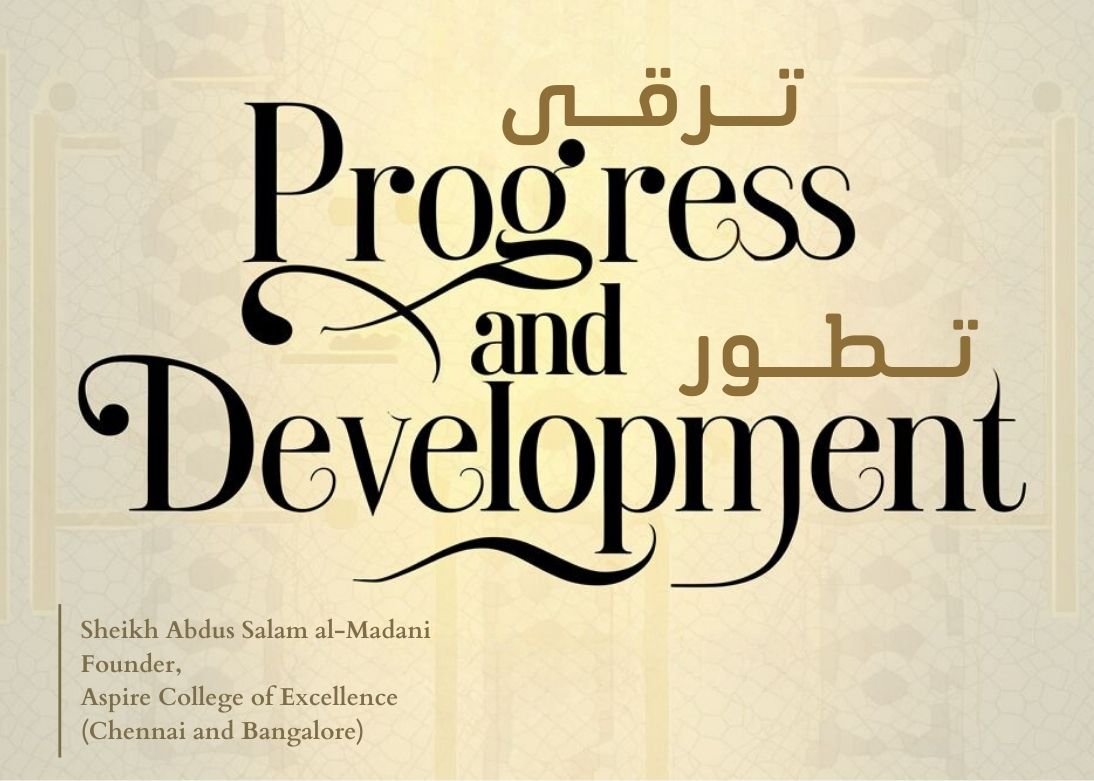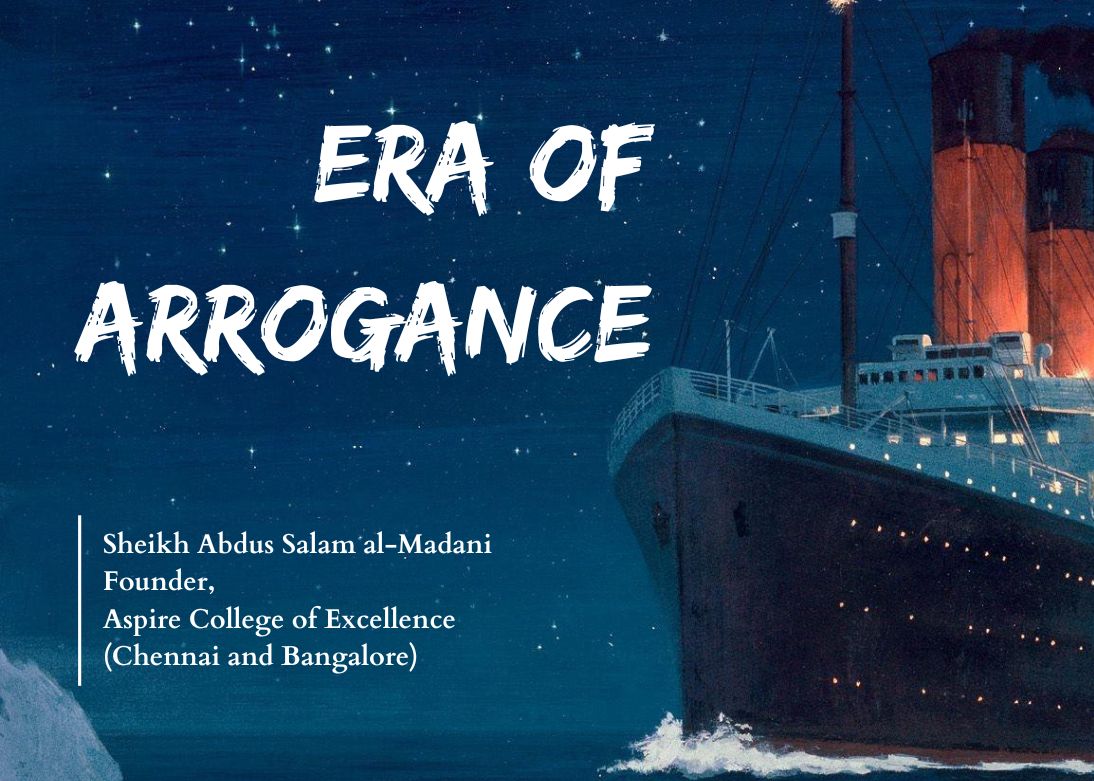
The Quran is true, our beloved Prophet Mohammad ﷺ is true, and his guidance is true. His guidance was embraced by the Sahabah, memorized, practiced, written down and passed on to future generations. Similarly, the Tabi’een protected this Amanah (trust) and passed it on to future generations. There is no such person in the world except Muhammad ﷺ, whose words are remembered and acted upon. Each and every action and teaching of his is preserved, which is called the religion of Islam, and this is the true religion.
The messenger of Allah ﷺ strongly commanded us to stick to the same religion even after his demise, and to not deviate from it in the slightest. At the same time, he also foretold that there will be disputes and differences, but the religion will remain preserved in the form of the Qur'an and the Sunnah, so stick to my Sunnah and the sunnah of the rightly-guided caliphs. The farther one goes from it, the more astray he becomes. Therefore, the Sahabah rejected many good deeds by saying that the Messenger of Allah ﷺ did not do them. Once some Muslims were engaged in collective dhikr in Masjid-e-Quba, when Abdullah Ibn Masood(RA) came and threw pebbles at them and rebuked them saying that you people are doing something that the Messenger of Allah ﷺ did not do.
Imam Malik (may Allah’s mercy be upon him) said that the Sunnah is the ark of Nuh (alaihissalam). He who remains upon the Sunnah is saved, and he who abandons it is perished. The Sahabah treasured this fact and held it dear to their hearts.
Islam imparted a completely new system to the whole world; it was putting the entire humanity on a completely new path in all walks of life; politics, worship, economics, transactions, sociology, and ethics. It all started with "La" which means “No”, totally rejecting all the self-made beliefs, actions, religions, philosophies, and then inviting all to follow the ultimate truth, as in it alone lies the success of mankind. It was such a great revolution, the likes of which the world never witnessed before, nor will it ever witness again.
The Sahabah understood this very well and changed themselves completely. They accepted Islam in its entirety, propagated it, and did not allow it to get changed in the least. When an earnest generation like that of the Sahabahs was ready, the prophet Muhammad ﷺ left this world, and even as he was departing, he cautioned, “I am leaving two things among you, the Book of Allah and my Sunnah, you will never go astray so long as you cling to them firmly”.
Then came the reign of Hazrat Abu Bakr (RA), then Hazrat Umar (RA) was martyred, and the people of Iran, by building a huge shrine for the murderer of Hazrat Umar (RA), pay tribute to him even today. The same group of the killers of Hazrat Umar (RA) became stronger and even killed Hazrat Uthman (RA), and forcibly handed over the caliphate to Hazrat Ali (RA) and followed him, and this group got called as the Shi'a. Their ideologies kept changing with the passage of time to the extent that they now consider wiping out the Sunnis as necessary. In the beginning they were quite few and it was only a political disagreement, but gradually they broke away from the Jama’ah of the Sahabahs, and adopted the name of 'Shia', as opposed to the Sahabah who called themselves as just 'Muslims'.
Once the doctrines and standards are lost, what else can happen other than disputes? That is why these Shīʿa further divided into numerous sects by the names of Zaidi, Howsi, Ithna-ashari, Jafri, etc. who still exist in large numbers. When their followers became further corrupted, they split up again and formed separate groups like Nusairi, Alavi (ruling family of Syria), Nazari, Agha khani, Ismaili, Bohra, Druze, etc., who are still quite powerful and widespread.
In opposition to the Shīʿa, there emerged a group that went to the other extreme, they labeled the early Shīʿa as 'kafir' (infidels), and even opposed Hazrat Ali (RA) and started fighting against him and the Sahabah, i.e. the Muslim group, and they came to be known as Khawarij in history. They too got divided into many sects, even today the rulers of Oman belong to one of these sects Ibbazi, which is a branch of Khawarij.
Later on, when the people of Iran, Khorasan, India, etc embraced Islam, the issue of taqdeer (predestination) was beyond their understanding, so they denied it and were called as Qadariah. So far, the Sahabah were still alive, warning the Ummah against these groups and kept recommending to follow the Quran and Sunnah.
After the period of the Sahabah, just like seasonal insects and bugs, various new groups broke off from the main group of Sahabah and adopted new catchy names to identify themselves.
Then came the Mu'tazila(rationalists), who were influenced by Greek philosophy and claimed that Allah is not Al-Rahman and Al-Raheem, because this constitutes three Gods, and thereby rejected all the attributes of Allah. They further said that all Shariah edicts that go against logic ought to be rejected. In this way, they threw away the 'Eeman bil ghaib' (belief in the unseen). For a period of time in history, these rationalists came into positions of authority, and based on the perverted methodology of their logic, persecuted the Muslims who believed that the Qur'an was nothing but the divine word of Allah. The students and followers of the Sahabahs came forward, and demanded evidence from the Qur'an and Hadith for the mu'tazilites' preference of intellect over Revelation, and kept sacrificing their lives for this issue; and thus they were distinguished by the title 'Ahlul Hadith' (people of Hadith). Their leader, actually the leader of the original Muslim Jama’ah, Imam Ahmed bin Hanbal (may Allah have mercy on him), was flogged for 18 years and put in prison; but he did not kneel before the government. He used to be flogged but persisted in calling out the Qur'an, to be the word of Allah and remained steadfast on it until his end, because the followers of the Sahabahs believed the Quran to be the word of Allah.
Influenced by this ideology, many offshoots sprang up like Jahmiyah, Qadariyah, Jabariyah, Karamiyah etc and spread widely. Even today, many followers of these ideologies are found.
Some well-intentioned people attempted to refute the Mu'tazilites using logic(rather than textual evidence), and ended up committing more mistakes in the process, since the human intellect is limited and has an element of subjectivity. The followers of the methodology of the Companions reproached them, saying that this is not the way of the Sahabah, do not argue using your intellect, but rather demand the evidence from the Quran, Sunnah, and the way of the Sahabah! But they continued to argue using logic and made their own rules and regulations, that is why they came to be known as Ash'ari/ Maturidi, Ahlul Kalaam (people of rhetoric). The Sahabah's jamaat patiently corrected them saying we solve problems on the basis of Hadith and Sunnah, and since you ignored the way of the Sahabah and made your own separate identity, so we are no longer with you, and hence they kept away from them. In this way, they once again distinguished themselves as the champions of the Sunnah and Hadith.
So far, I have mentioned the famous groups and parties from the earlier centuries who are called as sects in the Islamic terminology, who made ideology, intellect and philosophy as their basis. Following this, some party or the other, organizations, and movements on account of necessity, expediency, and slogan kept coming and will keep on coming, as foretold by our beloved Prophet. The group of Sahabah, who by now came to be known as the people of Sunnah and the people of Hadith, continued to reprimand them and will continue to do so, because they have to perform the task of (shahadat-e-haqq) bearing witness over mankind, and safeguarding the Sunnah.
Influenced by the thoughts of Mu'tazilah, the trend of denying hadith continued in modern times, as a complete denial like Parwezi, Chakralavi and Khaksari did; or a partial denial like Sir Sayyed, Fatehpuri, and Mashriqi; or denying a couple of hadiths like Farahi, Islahi, etc. Despite their great services, the people of Hadith warned them and are constantly engaged in performing this duty.
In the 4th century, some personalities from the Islamic jurisprudence viewpoint came onto the scene, and as a result of excessive usage of logic and reasoning in jurisprudence, they were called 'Ahl ur Rai' or the people of reasoning. And the people who tried to balance them out, by opposing them for their excessive usage of opinions against Hadith, were none other than the people of Hadith.
They adopted the way of the Sahabah and continued to invite towards it, no matter what the circumstances were. The followers of the great Scholars of jurisprudence after affiliating with them, called themselves as Zahiri, Awzai, Hanafi, Shafi'i, Maliki, Hanbali, etc. The standpoint of the followers of the Sahabah is to respect everyone and take knowledge and jurisprudence from everyone. It was not the way of the Sahabah to be tied to just one personality, because doing so is an insult to other Scholars, and may lead to favoritism, so they avoided these fiqh (jurisprudential) groupings with all the due respect.
Thereafter, many affiliations sprung up for the sake of moral, discipline, behavior, and purification like Chishti, Naqshbandi, Saharwardi, Qadiri, Rifa'i, Tejani etc. Many such institutions and their respective methodology i.e. peeri-muridi, bai’at-o-irshad, urs and meelad took shape. Even now the group of Sahabahs said, please forgive us, we avoid new groups and we cannot adopt or accept any new name.
Many political organizations were formed, but without the use of religion, there could be no attraction, and people could not be attracted towards it, so religion was exploited for the sake of worldly things. Tehreek e Khilafat, Muslim League, Hizbullah, and Ahrar were formed, but the main Jamaat of the Sahabah did not consider it appropriate to join hands with them or to blindly trust them.
Many organizations that wanted to impose Islam on governments rather than individuals also came into being. They may forgive the people but are bent on making the rulers pure Muslims. To this end, they raised slogans like Islamic government, Islamic caliphate, Iqamat-e-deen, and based on this many organizations and parties were formed. At that time, the Sahabah’s group, the people of Hadith did not consider it appropriate to join these organizations/parties and take on new names.
Many small and big sects started to break up from the main group of the Sahabahs, and the process still continues. The group of Sahabah and those who followed their way, were in majority at the beginning, but as people gradually started to break away from it, they decreased and will continue to become even lesser as time goes on. The news of this reduction is mentioned in the hadith that this religion began as something strange, and will end up strange as it began, so glad tidings for those who become strangers.
These strangers are the ones who uphold the way of the Sahaabah, and exhort everyone to follow this way. They have not made any sort of identity for themselves with regard to thought, theory, belief, politics, jurisprudence, or behavior, but rather considered it wrong to make such identities. Their call was nothing other than towards believing in the Qur'an and Hadith according to the understanding of the Sahabahs, and to follow their footsteps alone. They did not create any separate party or identity, so we too should not create one. Sadly, the people did not agree to it, and they preferred to choose their own distinct methodologies and identities. Despite these differences, and inspite of our shared commonalities, the group of the Sahabahs were compelled to distinguish themselves with a clarification title of Ahl us-Sunnah wal Jama'ahl/Ahl ul-Hadith to reaffirm their sincerity to the original methodology. Their thoughts, beliefs, jurisprudence, and methodology were exactly the same as what the Quran and Hadith or Islam dictates.
These poor people remained always the same and are still the same today. New names were only created by people who broke away from 'the Jama'ah' (the main Muslim community), and when the people who broke away became too numerous and took on their own separate names, the people of the Sahabah had no choice but to explain the word 'Muslims' with 'Ahl us-Sunnah' and 'Ahl ul-Hadith' for clarification purpose, but their manhaj was none other than the Quran and Sunnah.
If someone is called Shia, Khariji, Ash'ari, Maturidi, Naqshbandi, Chishti, Ikhwani, Deobandi, Barelvi, Tablighi, Jamaat-e-Islami, etc; it means he uses these affiliations to identify himself and/or his group and to introduce his methodology among the Muslims. In such a scenario, the group that has been following the way of the Sahabah right from the time of Sahabah termed itself 'Ahl-ul- Hadith' or 'Ahl-us-Sunnah wal-Jama’ah'.
If you are a Muslim then I am also a Muslim, but if you are a Shia, Khariji, Mu'tazili, Ash'ari, Maturidi, Hanafi, Shafi'i, Tablighi, Ikhwani, Tehreeki, etc., then forgive me, uncompromisingly I am just a Muslim who follows the jamat of the Sahabahs i.e I am with the people of Sunnah and Hadith, and I wholeheartedly consider you my brother, but I cannot abandon the orginal Jama’ah and support your new affiliation, and if I do, I will be detached from other brothers, which I absolutely do not like. Therefore, I will keep loving and requesting all my brothers to leave their separate identities and once again become united like the Sahabah, and fulfill the dream of one single Ummah!!
Sheikh Abdus Salaam Umari, Madani
Founder,
Aspire College of Excellence (Chennai and Bangalore)
Comments (0)
Categories
Recent posts


Era of Arrogance
6 Feb 2024
Tears of a Man
13 Feb 2024
GST or Zakah
9 Apr 2024




